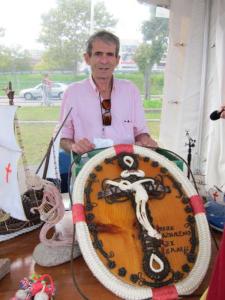Marco Randanzzo

The Working Waterfront Festival Community Documentation Project
This project documents the history and culture of the commercial fishing industry and other port trades. The project began in 2004 in conjunction with the Working Waterfront Festival, an annual, educational celebration of commercial fishing culture which takes place in New Bedford, MA. Interviewees have included a wide range of individuals connected to the commercial fishing industry and/or other aspects of the port through work or familial ties. While the majority of interviewees are from the port of New Bedford, the project has also documented numerous individuals from other ports around the country. Folklorist and Festival Director Laura Orleans and Community Scholar and Associate Director Kirsten Bendiksen are project leaders. The original recordings reside at the National Council for the Traditional Arts in Maryland with listening copies housed at the Festival's New Bedford office.
Laura Orleans
Marco Randazzo is a retired fisherman and rope sculptor originally from Palermo, Italy. Born in 1945, he immigrated to Gloucester, Massachusetts in 1969 following an earthquake in Italy that worsened an already difficult economy. Coming from a family of fishermen, Randazzo continued the tradition in Gloucester, often working as the "twine man" in charge of maintaining and repairing the nets on the fishing boats. In his retirement, he has taken his skill with knots and rope and creates rope sculptures of figures and religious icons, many related to his life on the sea. He values his independence and has a deep connection to the sea, even in retirement he visits the water every day.
Scope and Content Note
This interview with Marco Randazzo, conducted by Madeleine Hall-Arber on September 26, 2010, provides a detailed account of Randazzo's life as an immigrant fisherman in Gloucester, Massachusetts. The interview covers a range of topics including his background, his immigration to Gloucester following an earthquake in Italy, his work as a fisherman, and his transition into rope sculpture in his retirement. Randazzo discusses the impact of regulations on the fishing industry, the differences between fishing in Sicily and the U.S., and the changes he has observed in the industry over time. He also shares his experiences working on Gloucester draggers, his role as the "twine man" responsible for repairing nets, and his memories of winter fishing. In addition, Randazzo talks about his love for the sea, his decision to work on a boat regardless of the job, and his preference for independence over belonging to any fishing organizations. The interview provides valuable insights into the life and experiences of an immigrant fisherman in Gloucester, as well as the broader context of the fishing industry and community in the area.
Please Note: The oral histories in this collection are protected by copyright and have been created for educational, research and personal use as described by the Fair Use Doctrine in the U.S. Copyright law. Please reach out Voices@noaa.gov to let us know how these interviews are being used in your research, project, exhibit, etc. The Voices staff can help provide other useful resources related to your inquiry.
The NOAA mission is to understand and predict changes in climate, weather, oceans, and coasts, to share that knowledge and information with others, and to conserve and manage coastal and marine ecosystems and resources. The Voices Oral History Archives offers public access to a wide range of accounts, including historical materials that are products of their particular times, and may contain offensive language or negative stereotypes.
Voices Oral History Archives does not verify the accuracy of materials submitted to us. The opinions expressed in the interviews are those of the interviewee only. The interviews here have been made available to the public only after the interviewer has confirmed that they have obtained consent.
